Gender-based discrimination was a key theme in the 72nd Avignon festival. At least twelve shows in the festival program dealt with gender questions. Il pourra toujours dire que c’est pour l’amour du prophète (He can always say that it’s for the love of the prophet), written and directed by French-Iranian playwright, performer and translator Gurshad Shaheman, which premiered at the Festival on July 11, was an especially successful treatment of the plight of today’s refugees, fleeing their countries for personal or political reasons.
Shaheman’s stage is a dark cavernous space. A mysterious halo of light reveals the figure of a young person sitting on the floor. Her eyes are closed. With microphone in hand, she begins to tell a story about her early years. We learn how her parents, a Syrian father and a Lebanese mother, met in Canada and fell in love. She became pregnant but they did not marry. Before long we hear another voice and then another and another, each telling different stories, superimposed on each other and accompanied by Lucien Gaudion’s powerful electro-acoustic score. As lights slowly come up, we discover other young people, eighteen in all, each one isolated in a halo of light. Some are lying down, others seated on chairs, others kneeling with their backs to the audience, and others standing. The yellows, reds, white, blues and blacks of their tee shirts, jeans and dresses, create a kaleidoscopic tableau. With only a flashlight, a bottle of water and a microphone, they tell stories of intolerance, cruelty and bravery.
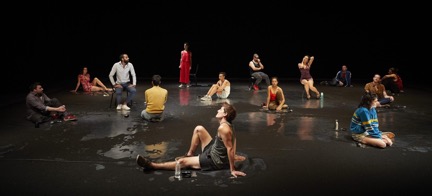
Il pourra toujours dire que c’est pour l’amour du prophète (He can always say that it’s for the love of the prophet). Photo: Christoph Raynad de Lage.
These stories are authentic tales of coming-of-age and difficult journeys endured by a group of refugees interviewed by Shaheman in Calais, Beirut and Athens. He spoke at length with Syrians, Iraqis, Tunisians and Iranians, most of whom did not speak French or English so he had to use a translator. Most of them were artists and members of the LGBT communities in the Maghreb and the Middle East. They ranged in age from 17 to 30. Based on bits and pieces of the words of these exiles, Shaheman developed a kind of performative writing which he transformed into a scenic work “performed” by fourteen members of the ERAC, a well-known acting school in Cannes, along with four of the refugees that Shaheman interviewed.
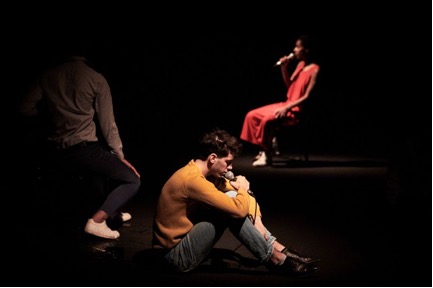
Il pourra toujours dire que c’est pour l’amour du prophète (He can always say that it’s for the love of the prophet). Photo: Christoph Raynad de Lage.
Each story is unique. Some of them are horrendous in their details of torture and inhumane treatment. Others are told with humor despite their grueling experiences. Far from family and country, either out of choice or because of the threat of reprisals not to mention war, these young people have managed to survive and reinvent themselves. Yasmine, for example, was born with male anatomy but knew by age 5 that she was a girl. Her parents beat her but she held firm. At 17 she won a modeling contest organized by Elite, a modeling agency in Agadir. When they found out she was trans, she was not hired. Elliott, who met his first love in the army, tells of the dangers they faced trying to rendez-vous. Another voice describes the tortures endured in Syria because of his homosexuality; almost his entire family wanted to put him to death but he was saved by his amazing grandmother.
The title of the 90-minute show comes from a response from one of the refugees, Mohammad, who fell in love with Bashar, a Syrian who lives in Istanbul. He is a married man who chooses to stay with his wife and children. Mohammad now lives in Germany. They can only communicate through Whatsapp but their passion endures. Bashar has had Mohammad’s name tattooed on his arm. When Mohammad asks his dear friend what people will think when they see the name Mohammad on Bashar’s arm, Mohammad tells him that if anyone ever asks him what this tattoo means, he can always says it is for the love of the prophet.
In the center section of Prophet, the refugees describe their dangerous journeys over mountains, on the seas and across borders. It is truly a miracle that they survived. In the final section of this “documentary concert,” their eyes are open to the future and the possibility of finding love, which has been the common thread throughout the play. One of women sings “C’est si bon…” to be in love, even if it is temporary.
Trans (Més Enllà), Trans (Beyond), written and directed by Didier Ruiz, is another transgender focused performance. In contrast to Shahemann’s piece, Trans introduces the audience to seven non-actors from Barcelona who have agreed to come out on stage and share their stories of gender transition with us. They speak in Catalan, Spanish, and French. Clara, Sandra, Leyre, Raul, Ian, Danny and Neus present themselves to us on a bare stage appearing sometimes as a group, sometimes solo, or with one or two others. They appear from behind a white curtain. They range in age from 22 to 60 and offer a spectrum of experiences. Some were rejected, some were painfully mistreated when they came out, others were received with kindness and understanding.
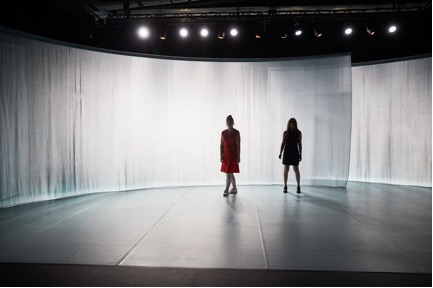
Trans (Més Enllà), Trans (Beyond). Photo: Christophe Raynad de Lage.
Raul, formerly Laura, is happily married to a woman who has children who call him “Papi.” “I am a man and I do not have a penis.” He tells us. “You don’t have to have a penis to be a man.” Clara waited until she was 60 to transition into a woman. Another person felt like an ugly duckling rejected by family and friends until they believed that ugly ducklings can become beautiful swans. These seven citizens of Barcelona deliver their life stories in a straightforward, direct manner, facing the audience as if telling each one of us what they have gone through. Their message was received with a lengthy standing ovation.
This year’s “feuilleton,” a series of daily free performances and lectures that have taken place in the garden of the Ceccano Library at noon since 2015, was created and directed by David Bobée. Entitled Mesdames, Messieurs et le reste du monde (Ladies, Gentlemen and the rest of the world), the show was dedicated to gender exploration from discussions of “what is gender?” to an Atelier Drag King and a Gender tribunal and finally a Binary Ball. These issues were examined with both humor and seriousness. Especially delightful was a send up of the Molière Awards ceremony, France’s equivalent of the Oscars, featured Phia Ménard, Gurshad Shahemann, and other transgender artists receiving non-racist, non-gendered awards which they read out loud to the delight of the “sold-out” event.
La Reprise (Histoires) du théâtre (1) (Reenactment), a collective creation conceived and directed by Swiss director Milo Rau, is based on the story of the murder of Ihsane Jarfi, a young gay man in Liege, in April 2012. Ihsane was beaten to death by four young men and left to die alone in a forest. His naked body was found two weeks later.
Rau’s approach to this material is to explore the crime through documents and research, interviews with Ihsane’s parents and friends as well as one of the killers who is in prison. His play seeks to tell the story of this heinous crime from all angles.
He begins by holding auditions to cast the roles of the killers and the young man who was murdered. There are glasses, coffee cups, papers and recording instruments on one side of the stage. Across from these, the director and his team sit waiting to begin the auditions which will take place in front of a large screen.
Suzy Cocco, who takes care of a rich family’s dogs, is first to try out. Johan Leysen, a well-known Belgian film actor asks her if she would perform nude if requested. She agrees and they play out a nude scene together. She will play Ishane’s mother. Next, Fabien Leenders, a former mason turned warehouse clerk who is an amateur actor in Liege, hopes to be chosen for a role. He is asked to hit a woman hard to see if he is capable of playing the role of one of the killers with conviction. He slaps her so hard that she falls down. Professional actors join them to explore how they might best represent such violence dramatically. They retrace the steps leading up to the crime from when Ishane was drinking with a friend in a bar to his unintentional meeting with four strangers who asked him if he would like to go for a ride. He innocently gets into their car and they drive off. Before long, they stop the car and start to beat him as they shout homophobic epithets at him. They throw him in the trunk of the car and take off. We are told he was praying in the trunk.

La Reprise. Photo: Christophe Raynad de Lage.
In the final part of La Reprise, the crime is stunningly reenacted with no attempt to spare the audience from the grisly details. A car is pushed out onto the stage and a reenactment of the grisly murder takes place. The four killers entice Ishane to go with them on a joy ride. They get in the car and beat him up, he wants to get out but they throw him in the trunk. As he is praying, they kick him, undress him, pee on him, and leave him in the middle of a forest completely naked. The stark realism of this murder is frighteningly accurate. One wonders if it is absolutely necessary.
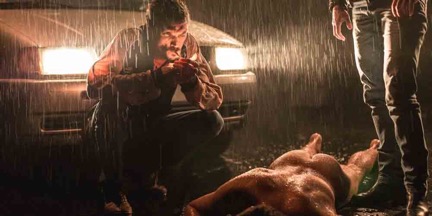
La Reprise. Photo: Christophe Raynad de Lage.
The play ends with Tom Adjibi, the actor who played Ihsane singing The Cold Song, music by Henry Purcell, and climbing up on a chair, putting a noose around his neck and daring anyone to come save him.
Ivo van Hove’s De Dingen Die Voorbijgaan (Old people and the Things that Pass), based on a psychological tale of family discord and hidden crimes written by Louis Couperus, is also about a murder. Ottilie, now 97 years old, killed her husband with the help of her lover some sixty years before the play opens. It is time for the reckoning. The stage is bathed in black and gray throughout the two hours of this grim tragedy. Rows of chairs are lined up across from each other with a wide path in-between, down which Ottilie and her lover slowly walk as they review their heinous crime which they have kept secret for all these years. Three generations of family members come and go, telling of their unfulfilled lives as the tick-tock of a clock counts out the minutes left for the old couple as they approach the end of their lives, leaving us with an indelible image of tormented souls.
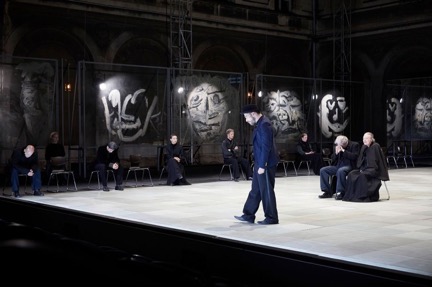
De Dingen. Photo: Christophe Raynad de Lage.
For Certaines n’avaient jamais vu la mer (Some of these women had never seen the sea), director Richard Brunel adapted American-Japanese author Julie Otsuka ‘s award-winning novel The Buddha in the Attic, about the thousands of Japanese women who were sent to the US as mail-order brides in the early 20th century, and their subsequent experiences. Struck by similarities between the odyssey of these Japanese women and the fate of today’s displaced families struggling to find a home in a foreign land, Brunel tells their story in a succession of scenes which follow them from their arrival in California in the early 20th century to December 1942 when they and their families are forced to live in internment camps.
1907 – 1924: The play begins as we hear the rumbling noises of a ship’s engine, a group of young Japanese women come onto the stage in front of a line of white box-like structures. One of these serves as a closet in which to hang their kimonos. Another has a mirror they use to primp and pose. They are excited about the husbands they will meet in California, and try on kimonos and help each other with their hair. Thanks to voice-overs and large blown-up close-ups of the women projected on to the white walls of the boxes, we learn that their handsome husbands (they have sent photographs) have written beautiful letters to them. They giggle as they wonder what their wedding nights will be like. They are in for a terrible awakening.
The future husbands turn out to be rough, ignorant field workers who brutally rape their virginal wives and put them to back-breaking work. Their happily married life is a form of slavery. They are not allowed to leave their houses. For three years they work digging for beets, onions and potatoes in what look like fields made of black cork. Only seven of them survive.
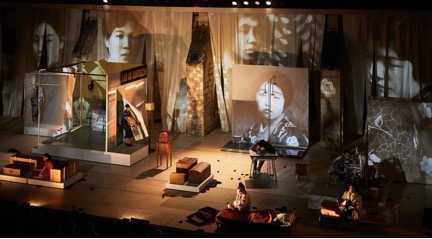
Certaines n’avaient jamais vu la mer (Some of these women had never seen the sea). Photo: Raynad de Lage.
1925 to 1940: A series of scenes following the lives of other Japanese women, played by the same actresses. These women are working in a factory making clothes, sewing red material. They spend long hours at their cumbersome sewing machines, tolerating loud pounding noises and a boss who does not always pay them on time.
They next become maids hired by wealthy American white women to clean, cook and take care of their children. They are sometimes forced to sleep with their bosses’ husbands. Gathered in a kitchen on a platform, stage right, they talk together about the subservient lives they are now living. One of them admits that she both hates her boss and wishes she could trade places with her. They write to their mothers back in Japan, telling them invented tales of the fabulous lives that they are leading in sunny California.
They eventually marry and have babies and seem to begin to enjoy some kind of happiness with husbands who have good jobs and children attending school and learning English. The problem is that the children turn against their parents, and refuse to speak Japanese or adhere to the customs of the old country. In the end, they are forced to leave their homes to migrate once more, this time to the Japanese Internment camps.
October – December 1942: In the final scene, a wealthy white woman comments on the fact that all of the Japanese have disappeared. She seems perplexed by this but does not question it as she ironically sings “I’ll be seeing you in all the old familiar places …”
Summerless, by Iranian director Amir Reza Koohestani, performed in Farsi, offered a welcome moment of quiet reflection. Whatever drama there is, it is muted. Life is at a standstill.
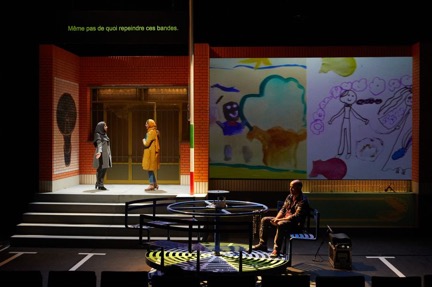
Summerless. Photo: Christophe Raynad de Lage.
The play takes place in the schoolyard of a primary school in the summer. In the yard is a merry-go-round, but there are no children to play on it. The headmistress, a woman in her forties, has called on her ex-husband, an artist out of work, to paint the school’s walls. His mission is to cover up the revolutionary slogans that had covered the walls for the past 20 years. She wants them replaced with a huge fresque to erase the traces of the Iranian revolution. This is a daunting job which he is not enjoying until he meets a young mother who has come to pick up her child. They strike up a friendship, as she returns every day.
Conversations take place between the headmistress and the painter, and then the headmistress and the young woman, and the young woman and the painter. There is a fourth presence, a young seven-year-old girl who has disappeared. The head mistress is concerned about the school budget as well as her hopes of having a child. The young woman shares her concerns with the painter about a lack of money and social status. The painter is unhappy that his paintings do not sell and that he is being accused of molesting Tiba, a seven-year-old girl who is missing. In the final scenes, a close-up video of Tiba appears on the school wall. She is clearly upset. She had developed a crush on the painter and he had been kind to her, a kindness which she had mistaken for love.
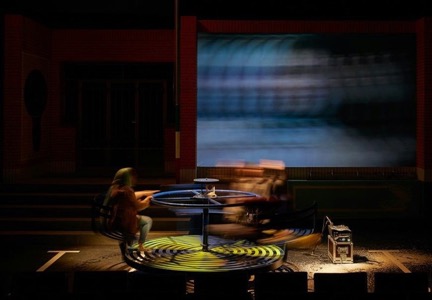
Summerless. Photo: Christophe Raynad de Lage.
The school serves as an example of the movement in Iran to turn public schools into private establishments. The destruction not only of the wall but of education and desire.
This year’s festival poster and program covers by Claire Tabouret, are composed of a tableau of children’s faces, boys and girls looking directly out at us every time we enter a theatre, as if silently pleading with us to pay attention, to listen hard to the lessons learned.
Philippa Wehle is Professor Emerita of French Language and Culture and Drama Studies at Purchase College, State University of New York. She writes widely on contemporary theatre and performance and is the author of Le Théâtre populaire selon Jean Vilar, Drama Contemporary: France and Act French: Contemporary Plays from France. She is a well-known translator of contemporary plays with a specialty in creating supertitles in French for emerging theatre companies. Dr. Wehle is a Chevalier in the Order of Arts and Letters.

European Stages, vol. 12, no. 1 (Fall 2018)
Editorial Board:
Marvin Carlson, Senior Editor, Founder
Krystyna Illakowicz, Co-Editor
Dominika Laster, Co-Editor
Kalina Stefanova, Co-Editor
Editorial Staff:
Joanna Gurin, Managing Editor
Maria Litvan, Assistant Managing Editor
Advisory Board:
Joshua Abrams
Christopher Balme
Maria Delgado
Allen Kuharsky
Bryce Lease
Jennifer Parker-Starbuck
Magda Romańska
Laurence Senelick
Daniele Vianello
Phyllis Zatlin
Table of Contents:
- Berlin Theatre, Fall 2017 (Part II) by Beate Hein Bennett
- Report from Berlin (June 2018) by Marvin Carlson
- Othello, Shakespeare’s New Globe by Neil Forsyth
- Resistance Through Feminist Dramaturgy: No Way Out by Flight of the Escales by Meral Hermanci
- 2018 Edinburgh Festival Fringe by Anna Jennings
- The Avignon Arts Festival 2018 (July 6 – 24): Intolerance, Cruelty and Bravery by Philippa Wehle
- Le Triomphe de l’Amour : Les Bouffes-du-Nord, Paris, June 15—July 13, 2018 by Joan Templeton
- The Kunstenfestivaldesarts 2018 of Brussels (Belgium) by Manuel García Martínez
- Somewhere Over the Rainbow: Contemporary Nordic Performance at the 2018 Arctic Arts Festival by Andrew Friedman
- A Piece of Pain, Joy and Hope: The 2018 International Ibsen Festival by Eylem Ejder
- The 2018 Ingmar Bergman International Theater Festival by Stan Schwartz
- A Conversation With Eirik Stubø by Stan Schwartz
- The Estonian Theatre Festival, Tartu 2018: A ‘Tale of the Century’ by Dr. Mischa Twitchin
- BITEF 52, World Without Us: Fascism, Democracy and Difficult Futures by Bryce Lease
- Unfamiliar Actors, New Audiences by Pirkko Koski
- Corruption, capitalism, class, memory and the staging of difficult pasts: Barcelona theatre and the summer of 2018 by Maria Delgado
- Reframing past and present: Madrid theatre 2018 by Maria Delgado
www.EuropeanStages.org
europeanstages@gc.cuny.edu
Martin E. Segal Theatre Center:
Frank Hentschker, Executive Director
Marvin Carlson, Director of Publications
©2018 by Martin E. Segal Theatre Center
The Graduate Center CUNY Graduate Center
365 Fifth Avenue
New York NY 10016
European Stages is a publication of the Martin E. Segal Theatre Center ©2018


